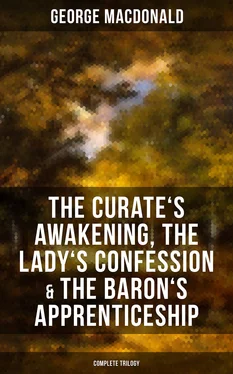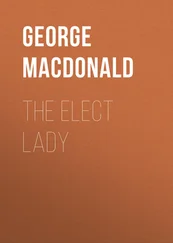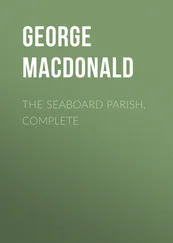His companion having carefully lighted his cigar all round its extreme periphery, took it from his mouth, regarded its glowing end with a smile of satisfaction, and burst into a laugh. It was not a scornful laugh, neither was it a merry or a humorous laugh; it was one of satisfaction and amusement.
"Let me have a share in the fun," said the curate.
"You have it," said his companion—rudely, indeed, but not quite offensively, and put his cigar in his mouth again.
Wingfold was not one to take umbrage easily. He was not important enough in his own eyes for that, but he did not choose to go farther.
"That's a fine old church," he said, pointing to the dark mass invading the blue—so solid, yet so clear in outline.
"I am glad the mason-work is to your mind," returned Bascombe, almost compassionately. "It must be some satisfaction, perhaps consolation to you."
Before he had thus concluded the sentence a little scorn had crept into his tone.
"You make some allusion which I do not quite apprehend," said the curate.
"Now, I am going to be honest with you," said Bascombe abruptly, and stopping, he turned towards his companion, and took the full-flavoured Havannah from his lips. "I like you," he went on, "for you seem reasonable; and besides, a man ought to speak out what he thinks. So here goes!—Tell me honestly—do you believe one word of all that!"
And he in his turn pointed in the direction of the great tower.
The curate was taken by surprise and made no answer: it was as if he had received a sudden blow in the face. Recovering himself presently, however, he sought room to pass the question without direct encounter.
"How came the thing there?" he said, once more indicating the church-tower.
"By faith, no doubt," answered Bascombe, laughing,—"but not your faith; no, nor the faith of any of the last few generations."
"There are more churches built now, ten times over, than in any former period of our history."
"True; but of what sort? All imitation—never an original amongst them all!"
"If they had found out the right way, why change it?"
"Good! But it is rather ominous for the claim of a divine origin to your religion that it should be the only one thing that in these days takes the crab's move—backwards. You are indebted to your forefathers for your would-be belief, as well as for their genuine churches. You hardly know what your belief is. There is my aunt—as good a specimen as I know of what you call a Christian!—so accustomed is she to think and speak too after the forms of what you heard my cousin call heathenism, that she would never have discovered, had she been as wide awake as she was sound asleep, that the song I sung was anything but a good Christian ballad."
"Pardon me; I think you are wrong there."
"What! did you never remark how these Christian people, who profess to believe that their great man has conquered death, and all that rubbish—did you never observe the way they look if the least allusion is made to death, or the eternity they say they expect beyond it? Do they not stare as if you had committed a breach of manners? Religion itself is the same way: as much as you like about the church, but don't mention Christ! At the same time, to do them justice, it is only of death in the abstract they decline to hear; they will listen to the news of the death of a great and good man, without any such emotion. Look at the poetry of death—I mean the way Christian poets write of it! A dreamless sleep they call it—the bourne from whence, knows no waking. 'She is gone for ever!' cries the mother over her daughter. And that is why such things are not to be mentioned, because in their hearts they have no hope, and in their minds no courage to face the facts of existence. We haven't the pluck of the old fellows, who, that they might look death himself in the face without dismay, accustomed themselves, even at their banquets, to the sight of his most loathsome handiwork, his most significant symbol—and enjoyed their wine the better for it!—your friend Horace, for instance."
"But your aunt now would never consent to such an interpretation of her opinions. Nor do I allow that it is fair."
"My dear sir, if there is one thing I pride myself upon, it is fair play, and I grant you at once she would not. But I am speaking, not of creeds, but of beliefs. And I assert that the forms of common Christian speech regarding death come nearer those of Horace than your saint, the old Jew, Saul of Tarsus."
It did not occur to Wingfold that people generally speak from the surfaces, not the depths of their minds, even when those depths are moved; nor yet that possibly Mrs. Ramshorn was not the best type of a Christian, even in his soft-walking congregation! In fact, nothing came into his mind with which to meet what Bascombe said—the real force whereof he could not help feeling—and he answered nothing. His companion followed his apparent yielding with fresh pressure.
"In truth," he said, "I do not believe that YOU believe more than an atom here and there of what you profess. I am confident you have more good sense by a great deal."
"I am sorry to find that you place good sense above good faith, Mr. Bascombe; but I am obliged by your good opinion, which, as I read it, amounts to this—that I am one of the greatest humbugs you have the misfortune to be acquainted with."
"Ha! ha! ha!—No, no; I don't say that. I know so well how to make allowance for the prejudices a man has inherited from foolish ancestors, and which have been instilled into him, as well, with his earliest nourishment, both bodily and mental. But—come now—I do love open dealing—I am myself open as the day—did you not take to the church as a profession, in which you might eat a piece of bread—as somebody says in your own blessed Bible—dry enough bread it may be, for the old lady is not over-generous to her younger children—still a gentlemanly sort of livelihood?"
Wingfold held his peace. It was incontestably with such a view that he had signed the articles and sought holy orders—and that without a single question as to truth or reality in either act.
"Your silence is honesty, Mr. Wingfold, and I honour you for it," said Bascombe. "It is an easy thing for a man in another profession to speak his mind, but silence such as yours, casting a shadow backward over your past, require courage: I honour you, sir."
As he spoke, he laid his hand on Wingfold's shoulder with the grasp of an athlete.
"Can the sherry have anything to do with it?" thought the curate. The fellow was, or seemed to be, years younger than himself! It was an assurance unimaginable—yet there it stood—six feet of it good! He glanced at the church tower. It had not vanished in mist! It still made its own strong, clear mark on the eternal blue!
"I must not allow you to mistake my silence, Mr. Bascombe," he answered the same moment. "It is not easy to reply to such demands all at once. It is not easy to say in times like these, and at a moment's notice, what or how much a man believes. But whatever my answer might be had I time to consider it, my silence must at least not be interpreted to mean that I do NOT believe as my profession indicates. That, at all events, would be untrue."
"Then I am to understand, Mr. Wingfold, that you neither believe nor disbelieve the tenets of the church whose bread you eat?" said Bascombe, with the air of a reprover of sin.
"I decline to place myself between the horns of any such dilemma," returned Wingfold, who was now more than a little annoyed at his persistency in forcing his way within the precincts of another's personality.
"It is but one more proof—more than was necessary—to convince me that the old system is a lie—a lie of the worst sort, seeing it may prevail even to the self-deception of a man otherwise remarkable for honesty and directness. Good night, Mr. Wingfold."
Читать дальше












